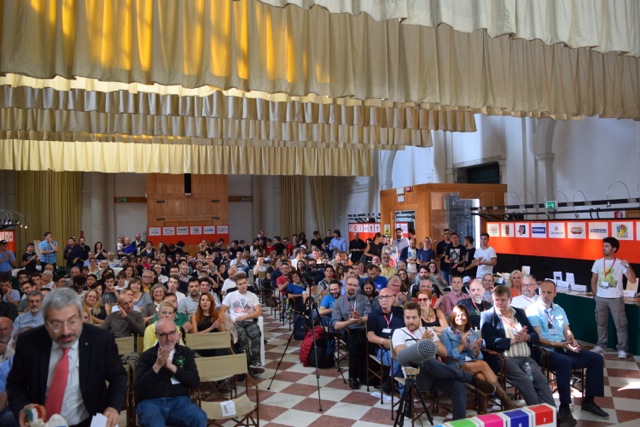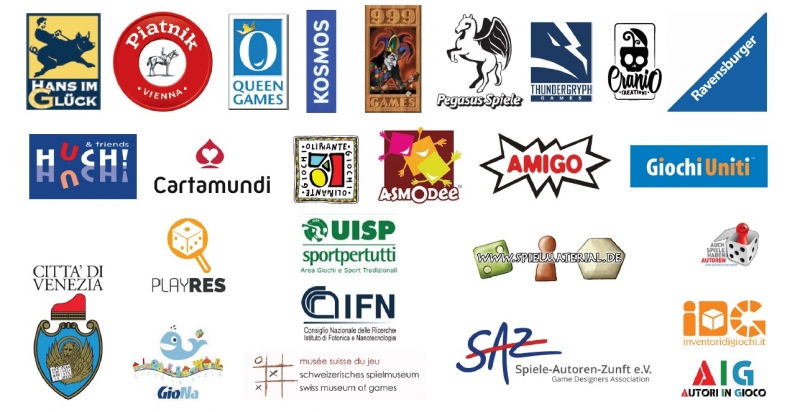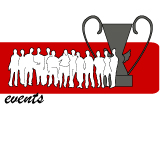

PREMIO ARCHIMEDE 2018, organized by studiogiochi, concerns the invention of unpublished boardgames.
The Prize, dedicated to the great Alex Randolph, who was its president during the first seven editions, made the wishes of more than 30 authors come true thanks to the pubblication of their games.
Everybody can participate (single or group), there are no age nor nationality limits.
The Competition is patronised by the City of Venice and is part of a series of cultural events dedicated to games, also as prevention against gambling disorder. The Prize is recognized by SAZ (Spiele-Autoren-Zunft), the international association of board-game designers, which reunites more than 400
members from 19 different countries.
The final ceremony will take place in Sala San Leonardo, in Venice, on September 29th, 2018.
In this occasion there will be an exhibition of the games in the final. The Musée Suisse du Jeu will organize an exhibition of the winning games.
The Prize is also recognized by PlayRes, by UISP (Unione Italiana Sport per Tutti) and by GioNa (Associazione Nazionale delle Città in Gioco) for its social and cultural value, and its capacity of aggregation and inclusion; it is in fact a ludic and recreational activity that promotes the right of playing for any person and for any age. Thanks to the support of the participating publishers (as for now, we have the confirmed participation of 999games, Amigo, Asmodee, Cartamundi, Cranio Creations, Giochi Uniti, Hans im Glück, Huch! & friends, Kosmos, Oliphante, Pegasus, Piatnik, Queen Games, Ravensburger, ThunderGryph while others are still perfecting their adhesion), winners will be given an advance of 3500 euros on their games’ future royalties.
Besides the Archimede Prize, the jury will assign the Special Recognition Sebastiano Izzo and many other categorybound awards, such as:
• Cartamundi Special Trophy for the best card game. Thanks to the support from Cartamundi, an advance of 500 euros will be given on the best card game’s future royalties.
• IDG Special Trophy (Inventori Di Giochi) for the best game entirely created by an author who never published a game before. In case of a prototype with more than one author, all of them must be never published authors. The winner will have the right to a free table during one of the next IdeaG events.
• AIG Special Trophy (Autori In Gioco) for the game with the most innovative mechanics. The winner will have the right to a free table during one of the next AIG events.
• Trofeo Speciale Scienza in Gioco, for the best science-themed game, whith divulgative and educational aspects, assigned by the Photonic and Nanotechnology Institute of the Consiglio Nazionale delle Ricerche (IFN - CNR). Moreover IFN-CNR will organize the second edition of Fotonica in Gioco. The competition is dedicated to all students from Italian secondary and high schools and focuses on the production of an original game with didactic or divulgative aspects (www.fotonicaingioco.it). The final ceremony will take place during the finals of Premio Archimede and will host the classes that produced the best three projects.

To participate send your prototype within 31/05/2018 to:
PREMIO ARCHIMEDE 2018
c/o studiogiochi
San Polo 3083 - 30125 VENEZIA
Each prototype must be attached with the participation form, signed and compiled. In addition to that, authors are required to pay a participation fee of 30€ for each game registered during 2017 or 35€ for each game registered during 2018, in these two possible ways:
1) paypal to info@studiogiochi.com.
2) bank transfer (IBAN DE09 3605 0105 0003 7001 84 BIC SPESDE3E).
SAZ members and participants of IdeaG and AIG events may ask to their associations a voucher to get a discount of 5€.
Besides sending the physical prototype, authors must send a photo of the prototype and the rules in PDF format, by mailing to info@studiogiochi.com
Eventual custom fees have to be refunded by authors, otherwise the game won’t be registered.
studiogiochi will have the right of first refusal on the finalist games (see the participation form).
There will be a participation certificate for each admitted game, to witness and certify the presentation of the game in that particular date.
All the games will need the requirements below. Without these they won’t be admitted to the final:
The game
- Has to be original and unpublished.
- Can’t last roughly more than 90 minutes.
The prototype
- All game components, including the game board, must be inside a rigid cardboard box. The box should be easy to open and close. It should be easy to transport: it is better to avoid too big or too heavy boxes (the ideal measures of a boardgame box are 40x30x10 cm).
- It should be functional: the jury has to be able to play it with ease. Pawns must stand well, spaces must be big enough, cards not too thin, colours easy to identify, and so on.
- The game should not depend on its language. If text is necessary it is recommended to use english, so that the jury is able to play it indipendently.
- It’s not necessary for the game to be final-quality, the graphic aspect is subordinate to the game’s functionality.
- Game pieces have to be wrapped separately in order to make it easy to get ready for the game.
- The organization is not responsible for any loss or damage of the prototype during the event.
Authors will be able to get back their prototypes at the end of the final ceremony; all non-collected prototypes won’t be sent back (unlessspecific arrangements are taken with our information office, within a month after the final, shipment paid by the authors). The finalist prototypes and those awarded by special prizes won’t be given back.
- On the box and on the rules there must be the name of the game, the number of players, the name and surname of any author, their full address, telephone number, and e-mail address.
The rules
- have to be written in the author’s mother tongue, and translated into English (the translation is optional for Italian authors).
- can’t exceed roughly 10.000 characters.
- must be clear to understand and complete (number of players, contents, aim of the game, etc..). It is advisable to use examples and figures. Before you send the game, let it be played by testers who learn the game ONLY by reading the rules (with no extra explanations). If the jury won’t be able to understand the rules, they won’t be able to test it or they will play it the wrong way. This way they won’t be able to judge the game correctly.
www.spielmaterial.de offers a 20% discount to any author participating in the Premio Archimede. Take this chance to realize your prototype in a professional way. Please contact the Premio Archimede info office to receive the discount code
The jury, the criteria and procedures for the selection of the games
There will be two separate juries. During the first part of the competition only the selection jury will be working. At the moment, the jury is composed by:
• Leo Colovini (president)
• Giuseppe Baggio
• Mauro Gaffo
• Dario Zaccariotto
• Umberto Rosin
• Alessandro Zucchini
• Federico Colovini
• Piero Modolo
The selection jury will carefully study all game rules, dividing them among its members.
• During the jury meetings each member explains to the others the rules he read. Each game will be played by at least two of the selection jury members. If during playing the game is judged as not appropriate, its playing can be interrupted before the end of the game.
• The jury will evaluate each game on the basis of the following criteria (ordered by importance):
- Originality of the game’s mechanics.
- Playability, balance and functionality of the mechanics.
- Amusement.
- Publishing potential, which is the possibility that the game will be taken into consideration by any publisher.
- Theme coherence.
- Quality of the prototype.
• Roughly a month before the final ceremony, the jury will reveal a Grossa-lista, which is the list of the games considered to be worth the exposition (more or less 50% of the registered games).
• Finally, the jury will select a Fina-lista (composed of around 15/20 titles), which will be presented to the final jury.
The final jury is composed at the moment by:
• Dario De Toffoli (president)
• Gonzalo Aguirre Bisi (ThunderGryph, Spain)
• Michael Bruinsma (999 games, Netherlands)
• Bernd & Moritz Brunnhofer (Hans im Glück, Germany)
• Stefano De Carolis (Giochi Uniti, Italy)
• Cyril Demaegd (Asmodée, France)
• Silvio De Pecher (Tana dei Goblin, Italy)
• Ulrich Fonrobert (Queen Games, Germany)
• Hermann Hutter (Huch! & friends, Germany)
• Simone Luciani (Cranio Creations)
• Uwe Molter (Amigo, Germany)
• Klaus Ottmaier (Pegasus, Germany)
• Barbara Schmidts (Kosmos, Germany)
• Philipp Sprick (Ravensburger, Germany)
• Dieter Strehl (Piatnik, Austria)
One week before the day of the final ceremony, each juror will play each finalist game, secretly noting his impressions and selecting his 7 favourite games. During the final, live, in front of the audience, each juror will secretly give 7 points to his favourite game, 6 to the second, and so on. Votes will be immediately counted and the final ranking of each game will depend exclusively on the amount of points received.
The selection jury will also choose the best card games, indifferently if they are or not among the finalists. These games will be judged separately by the final jury, with the help of Ileana Xodo from Cartamundi Italia and Luc Mertens, expert in card games. All members will award 3 points to their favourite, 2 to the second and 1 to the third. The winner will be awarded the Cartamundi Special Trophy.
Both juries will enjoy the help and suggestions of S. Scaramuzza, F. Berger, F. Bortolato, G. Franceschini, G. Marchesin, E. Marzorati, R. Nardo and of selected playtesters.







